#auloes
Explore tagged Tumblr posts
Text

WHAT a way to begin your book on performance and identity in the ancient world
#yes this is relevant to the ajax chorus singing 'he did not allot to me… the sweet sound of the aulos' *while accompanied by the aulos*#mine#bodycostume
203 notes
·
View notes
Text

So i got ahold of the game Hades and IT got ahold of me and I'm using that obsession to fuel my Muse AU
The story is basically the same except Sun and Moon are new Muses, with Y/N being their first Human they have to inspire
Eclipse is the head Muse and worries over Sun and Moon constantly (for good reason) and pops in often to see their progress
Sun is high strung and desperate to prove their worth as muses, while Moon is a bit too lax and content to continue being the court musician rather than dealing with mortals which makes it all the worse when things become an absolute mess
#wake up babes new muse designs just dropped#eclipse is probably my fav of the bunch#moon is holding an Aulos btw#dca fandom#dca au#fnaf sb#moondrop#sundrop#eclipse#fnaf eclipse#fnaf sun#fnaf moon#my art#fanart#fnaf security breach#muse au#muse sun#muse moon#muse eclipse#y/n#reader insert#muse au y/n#drummer y/n#sun x reader#moon x reader#sun x y/n#moon x y/n#and a little eclipse x y/n#as a treat#i love them dearly
445 notes
·
View notes
Text

artfight attack on @lopertinger Spamhard and @dravatti
113 notes
·
View notes
Text
Lads LADS LADS!!!!!!!! Darren korb fucking cooked AGAIN and he gave us a FEAST are you KIDDING ME??????
#OLYMPUS AFFLAME MY BELOVED!!!!!!!!!!!!!#HE GOT A FUCKING AULOS IN THERE BRO WHAT THE FUCK#WRATH OF THE HEAVENS IS SICK AS FUCK!!!!!!!!!#ITS GIVING GOD OF WAR#NAH BECAUSE THE WAY OLYMPUS HAS ORCHESTRAL MUSIC AND THE UNDERWORLD HAS METAL#LIKE OPPOSITES TO EACH OTHER#AUGH#AND FUCKING#MOUNTAIN OF THE GODS HAVING THE ON THE COAST MOTIF#BRO#BROOO#I MISS PERSEPHONE 😭#IM FREAKING THE FUCK OUT RN SOMEONE SAVE ME#hades 2#hades ii#darren korb#supergiant games
43 notes
·
View notes
Text
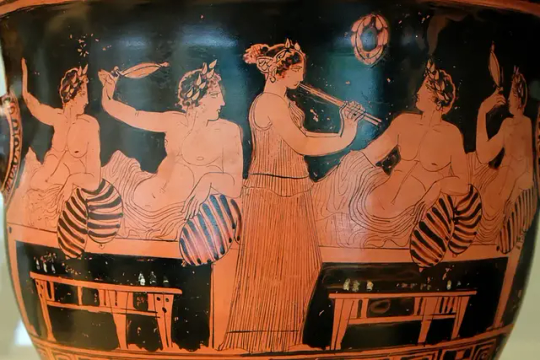

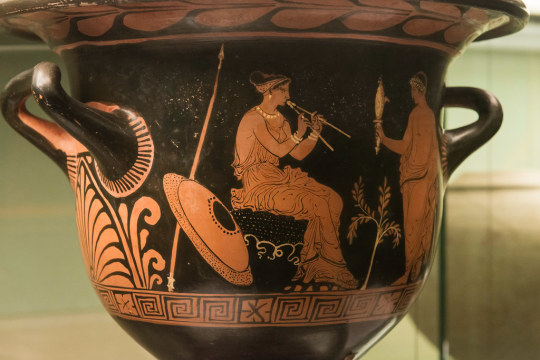
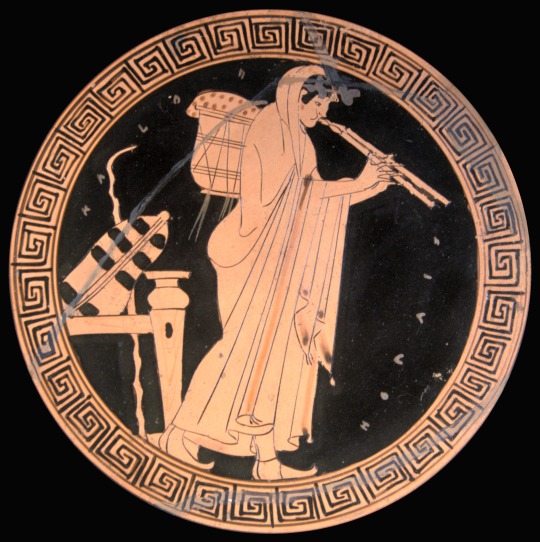
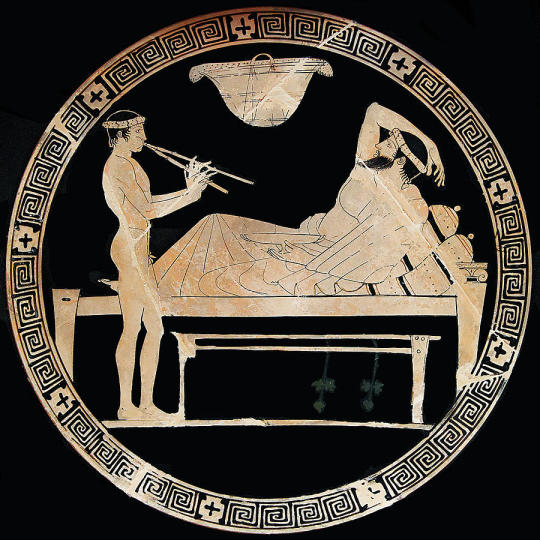
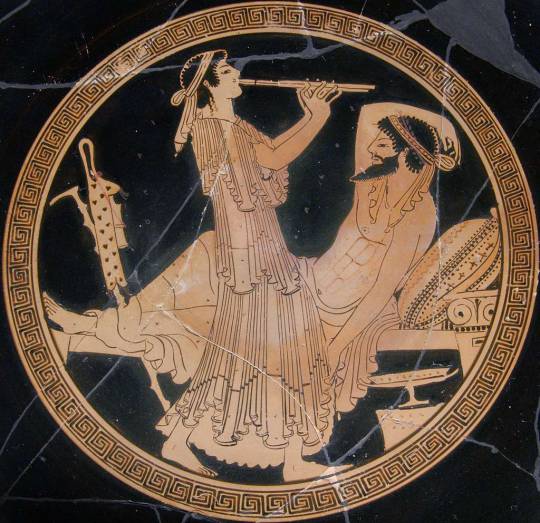
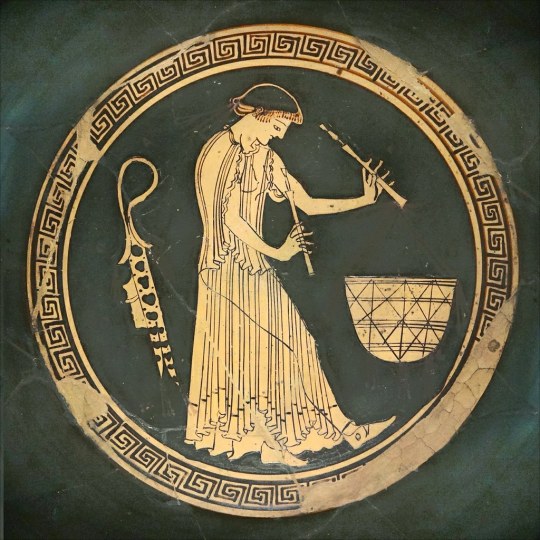
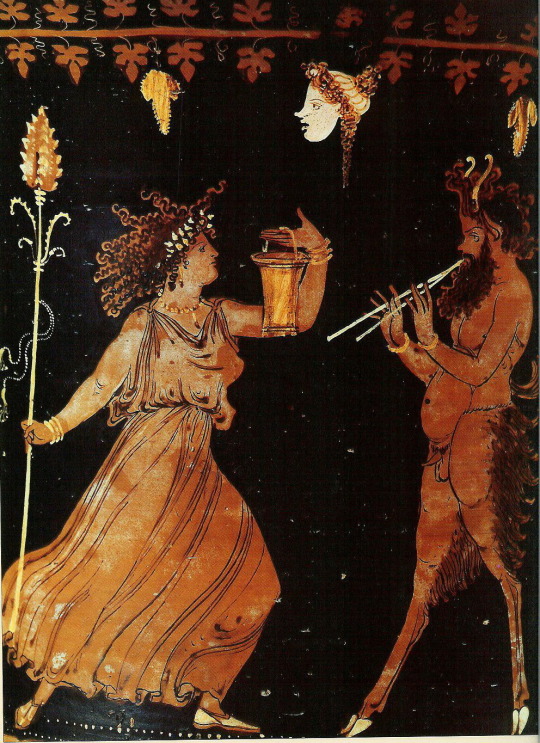
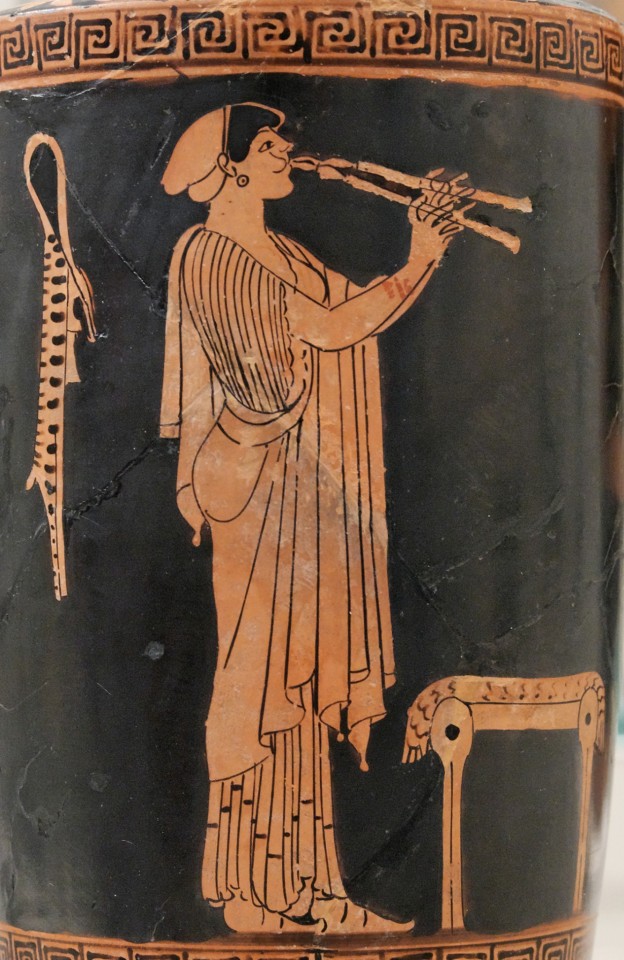
Ancient Greek pottery showing figures playing the auloi. The aulos (plural auloi) [Roman tibia, plural tibiae] is a double or single reed wind instrument, played in pairs, that "sounded more like the modern oboe than the modern flute." [source]
"Perhaps the most commonly played instrument in Greek music, the aulos was played in festivals, processions of births and deaths, athletic games ... It was associated with the god Dionysos and often played at private drinking parties." [source]
"Made from cane, boxwood, bone, ivory, or occasionally metals such as bronze and copper, the circular pipe (bombyke) was fitted with one, two or three bulbous mouthpieces which gave the instrument a different pitch." [source]
"The earliest surviving examples of auloi have been found at Koilada, Thessaly and date from the Neolithic period (c. 5000 BCE). These instruments are carved from bone and have five holes, irregularly placed down their length." [source]
#aulos#auloi#tibia#tibiae#ancient greece#pottery#ceramics#musical instruments#wind instruments#antiquities
98 notes
·
View notes
Text
Ancient Greek and Roman music Masterpost
As our national epic, the Odyssey, did I'll start from the middle. Please listen to the sound of medieval Greek music and then come back. It's an exercise, I command you!
Middle Ages Greek music is speculated to be "slowed down ancient Greek music"! 😁 So, take notes on that!
youtube
youtube
Christodoulos Halaris - Anthology of Byzantine Secular Music
(Christodoulos Halaris was a prominent Greek composer, researcher, and musicologist. He focused on secular Byzantine and traditional music, incorporating his extensive research into a solid and singular musical language.)
After your warm-up (and perhaps some confusion) let's get into what you came here to see.
What Ancient Greek and Roman Music Sounded Like - A Beginner's Introduction
youtube
Α fantastic introduction by a composer, musician, and researcher who calls himself:
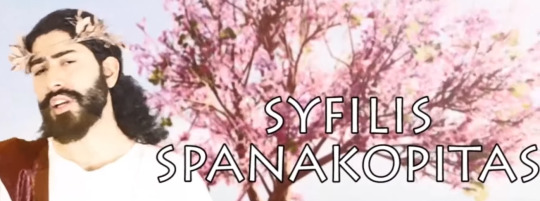
OKAY, OKAY, HE IS FARYA FARAJI, YOU GOT ME.
So, this is going to be another excellent video where he spits facts. He gives a great impression of how ancient Greek and Roman music sounded like.
And no, they didn't sound like the watered-down (north)-eurocentric "ancient Greek music" on youtube videos you find. (who's surprised at this point, after all this Northwestern appropriation) Unless they are made by Farya Faraji because… the man knows his shit (and our shit 😂)
By the way, I called it "watered down", not because I believe western music is lame, but because the performers apply western rules to ancient Greek music, stripping it of all the Heterophonic complexity.
In the video above, you'll learn how the lyre should actually be played!!! And what instruments have been in continuous use in Greece for more than 2.000 years! And see all the ways our ancient and traditional music is more complex than Western music - such as Western music can be more complex than ours in other ways! (as also stated in the video)
And before you ask: Why does ancient Greek and Byzantine/traditional Greek music sound Oriental? Well, that's just your ear and biases and Hollywood stereotypes, my dear friend. See, these sounds are not (just) Oriental! They are originally Greek, too!
Many tunes and the way of singing the West associates today with the Middle East came from the Greek world (where these tunes are still in use, mind you) or other Mediterranean countries. That's not to say that Middle Eastern nations didn't have these scales and twirls for a long time - because they did. That's their ancient music, too.
Please see the video below to make more sense of my ramblings:
The Greco-Roman Influence on Middle-Eastern Music
youtube
All of Farya's videos have their sources in the description so make sure to check them out!
Now you can better enjoy the Epitaph of Sekeilos you heard in the first Middle Ages video! You can also listen to another great version by Farya, where he uses the above ancient Greek principles he mentioned in his video. That's why his version actually feels fun to listen to, thank god! (Of course Chalaris also orchestrates the Epitaoh in an excellent way)
youtube
Personal commentary: I am happy to share Farya's work online because he put into words why reconstructions of ancient Greek music online don't sound Greek at all. Greeks have a hard time relating to it because... that's not our folk music. They sound boring like Chopin playing piano when he was 3 years old. (But by now you know why! 😉)
Of course, ancient and traditional Greek music are not identical and no one expects them to be. But given our history, our music history, and cultural evolution, we know the sounds of our music - as all people can identify the music of their land and area. I am glad my gut feeling was right and the music wasn't actually that simple. With the complexity of our ancient chants and the plethora of instruments we had in antiquity, there was no excuse for our ancient melodies to be that simple.
#ancient greek music#instruments#music history#middle ages#history of music#lyre#harp#ancient greek#classics#classic civilizations#bagpipes#aulos#pipes#roman history#panflute#mediterranean#historian#antiquity#farya faraji#chants#Youtube#byzantine music#byzantine empire#byzantium
175 notes
·
View notes
Text
Athena’s role as a ‘musician’ is, for example, recorded by Diodorus and, probably, by an unfortunately fragmentary late Attic inscription, which records a dedication to ‘Athena Mousikê’. Furthermore, as Pindar stresses, Athena is the genius of the aulos who tried to imitate by the aulos’ sound the noisy chorus made by Euryalus and Stheno when Perseus decapitated their sister Medusa. Thus the first sound of the flute relates to the sinister threnody of the Gorgons. However, rather than just being a noise, the sound is initially supposed to be a melody, a harmony, according to Pindar, of the multicephalus nome … Within this range of evidence Athena not only invents the instrument, but also takes it upon herself to create a musical composition which suits its specific sound. The composition is therefore an imitation, a mimesis, in this case of a goos, a lamentation.
“Athena Salpinx and the Ethics of Music,” by Anastasia Serghidou; collected in Athena in the Classical World
#this is a fucking brill book so none of us can afford it#try interlibrary loan#athena#aulos#hellenism#quotes
15 notes
·
View notes
Text

#anthro#anthropomorphic#art blog#artist on tumblr#art on tumblr#artwork#character art#digital artwork#digital drawing#digital illustration#drawing#illustrators on tumblr#my art#myart#small artist#bull#minotaur#aulete#aulos#musician#flute#greek#ancient
5 notes
·
View notes
Text

Ένας αέρας Βόρειος μου άγγιξε το χέρι, απαλά μου χάιδεψε τον σβέρκο,
Σ’ αναζητώ,
μες στο πλήθος να σε βρω,
κι αργά περπατώ,
να σ’ αγγίξω δεν μπορώ.
Σε φωνάζω δειλά,
πρόσωπα σβησμένα, θολά.
ποιος σωπαίνει, ποιος μιλά.
Θα ‘ρθεις, σ’ αναζητώ.
Σ’ αναζητώ,
μες στην πόλη τριγυρνώ,
σκοτάδι πυκνό,
ντύνομαι τον ουρανό.
Γύρω πόρτες κλειστές,
ίδιες όπως χθες και προχθές,
ώρες άδειες, μόνες, φριχτές,
κι όμως σ’ αναζητώ.
#γκρεεκ#γκρεεκ ταμπλρ#γκρικ ταμπλερ#γκρικ κουοτς#γκρικ ποστ#γκρικ μπλογκ#γκρικς#greece#ελληνικα στιχακια#psychodrama#psychodrama07#psyxodrama#aulos#dpth#ΔΠΘ#sanazito
2 notes
·
View notes
Text
regarding last reblog, the plot of my novel that I’m never writing is what if a nasty little goth girl was a serving maid in 10th century Constantinople
#and what if a woman who should own a motorbike was born 900 years before their invention#and they had to walk around the byzantine empire together. and they were both necromancer a#Thekla epiphania nolastname should be listening to teenagers by MCR but there’s only this fucking aulos and lyra
4 notes
·
View notes
Text
very strange when the chorus of ajax curses the man who invented war by saying "he did not allot to me... the sweet sound of the aulos" (1199-1204). they are singing this choral ode to the accompaniment of the aulos.
#huge implications actually. does the chorus know they are singing??? the actors can hear the aulos but the characters cannot#wait let me pull up what ringer has to say about anti-choric language in electra#mine#ajaxblogging#bodycostume#(<- sort of)#wonderful choral ode btw
31 notes
·
View notes
Text
why is polish wikipedia genuinely so much better than the english one
#at this point i'll just start translating articles#yeah english wikipedia has more information but in that it had less information. you kniw what im saying#i googles olympic muses. in polish they gave me a list of their roles and attributes with each having a sentence about them#and english is like. 'Polyhymnia (mime). Euterpe (flute)'#ah yes my favourite genre of art. flute.#and in polish one they tell me nicely that shes watching over the playing of the flute but also lyric poetry as well#and that shes often potrayed holding an aulos#english wiki could never#ramblings
5 notes
·
View notes
Text
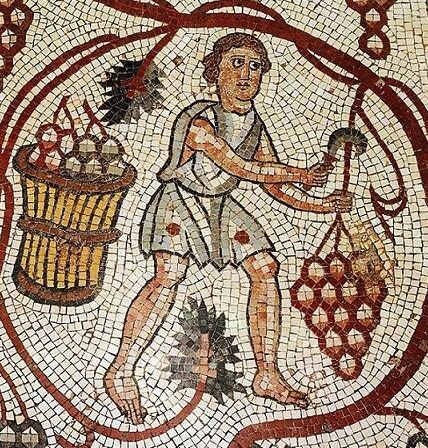
«Como no sabía absolutamente nada sobre la forma de cultivar los viñedos y los árboles, al ver casualmente a un vecino que estaba cortando las zarzas que habían crecido a lo alto y a lo largo, podando los fresnos casi hasta el extremo de la copa, arrancando de las raíces de las cepas los brotes de las vides que se habían desplegado por el suelo y cortando los renuevos alargados y derechos de los árboles frutales y de los olivos, se acercó y le pregunto por qué hacia una tala tan grande de madera y ramas. El vecino le respondió: ‘Para que el campo quede desbrozado y limpio y sean mas fértiles los árboles y las vides que hay en el’. El tracio le da las gracias al vecino y se aleja contento, como si hubiera aprendido el arte de la agricultura. Aquel hombre desdichadamente ignorante coge entonces un hacha y una hoz y tala todas sus vides y sus olivos, corta las esplendidas copas de los árboles y los ubérrimos sarmientos de las parras y arranca todos los planteles y brotes, que prometían una gran producción de frutos y cosechas, junto con las zarzas y abrojos, para limpiar el campo, pagando un triste precio por su temerario aprendizaje y actuando de modo erróneo por fiarse de una imitación equivocada. De igual modo —concluyó Herodes—, esos defensores de la impasibilidad, que quieren parecer tranquilos, serenos e imperturbables, al carecer de deseos, no experimentan dolor alguno, no se irritan, no se alegran y, una vez cercenados todos los impulsos vehementes del espíritu, envejecen en la indolencia de una vida inactiva y como enervada.»
Aulo Gelio: Noches áticas, II, Libro XIX. Universidad de León, págs. 247-248. León, 2006
TGO
@bocadosdefilosofia
@dies-irae-1
#aulo gelio#noches áticas#estoicismo#estoicos#herodes#herodes ático#impasibilidad#απάθεια#πάθη#época antigua#filosofía antigua#teo gómez otero#mosaico romano
8 notes
·
View notes
Note
was wondering if you’d want to make a post simply yapping about ancient greek instruments, i wish to learn moreee
Oh I really don’t have much to say at all about them, I was mostly exploring the wiki page and that’s about it lol, but since you asked!
I’m currently writing a fic rn where characters are playing instruments and I was curious about ancient greek instruments, considering all I really knew was the lyre and the aulos. So I decided to look up a wikipedia list and click around to see what I thought was pretty cool
(Quick disclaimer, everything I’m about to say is from wikipedia, so take it with a grain of salt. Also I am not a music historian or a musician so really I barely have any idea about what I’m talking about)
Turns out, there’s a million different versions of the lyre! They all look quite similar but I am sure they’re from different regions and have their own unique sounds and histories. The one I went with in my fic was the kithara! It is a seven stringed lyre-esque instrument that was mainly played by professionals (called kitharodes). Since lyres were considered a folk/beginner instrument, those who played music for a living tended to prefer the kithara. Fun fact! “Kithara” in modern greek means guitar, and the etymological origin of the english “guitar” comes from kithara. Words are cool!!!
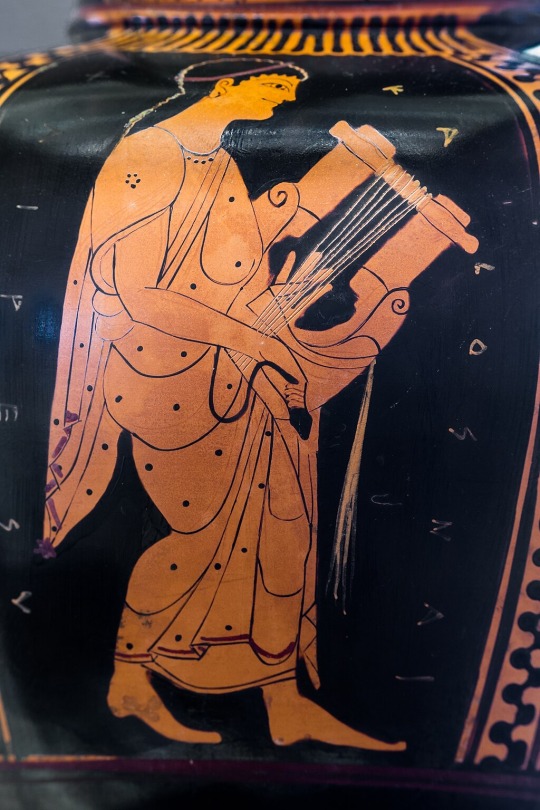
Please forgive me if I am using the singular/plural versions of this instrument wrong, I’m not entirely sure how this all works and I am trying my best
I was mainly excited about the krotalon (latin: crotalum) which were pretty much castanets! (I really like castanets because the fun clappy sound is nice in my ears lol) they were made out of wood or shell and brass and were mainly used by women in religious dances. Often at a slower beat/rhythm than castanets as we think of them today
More fun facts! This time bird related! Krotala allegedly made the sound of a crane’s bill, thus the bird was called crotalistria "player on crotala.”
In some versions of heracles’ myth, he uses krotala to scare away the stymphalian birds in order to shoot them down!

Now, I mentioned the aulos earlier but honestly I still didn’t know much about it other than what it sounded like. (Shout out to olympus alfame from the hades 2 soundtrack, absolute banger!!!)
Anyways, while the aulos may look like a modern flute or clarinet, it is more akin to highland bagpipes in multiple ways! We see similarities in the way it’s played (the use of circular breathing), in sound (the droning that people often find really annoying) and in function! (Both instruments were used to communicate on the battlefield.)
They were also double-reeded like oboes!
There’s multiple types of auloi. The plain “aulos” we think about is the two pipes with reeds. A single pipe without a reed was called a “monaulos.” A single pipe that was held horizontally like a flute was a “plagiaulos,” and a pipe with a bag (ahem, bagpipe, one may say) that allowed for continuous sound was called a “askaulos”
Finally, I want to talk about a myth surrounding the aulos. A satyr named marsyas either invented the aulos or picked it up one day after athena discarded it because she hated how it made her cheeks puff up (which is really funny to me). Either way, he gets his hands on the instrument and challenges apollo to a music contest (always a bad idea) the winner would “do whatever he wanted” to the loser.
If you’re a freak like me you probably had the same train of thought as marsyas who, being a satyr, would never turn down the opportunity to fuck our favourite sunshine twink. Unfortunately for him, apollo and his lyre beat him in the competition. Even more unfortunate is that instead of being taken by the god of light he is strung up on a tree and flayed alive for his hubris. Hooray!
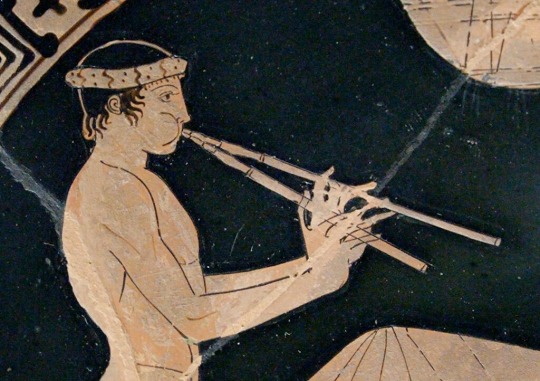
Ack it’s almost 4am I meant to go to bed an hour ago lmao (as if 3am is a reasonable time to go to bed)
Anyways I hope you enjoyed my yap sesh! I always get nervous when writing these up because I am bound to get information wrong. And if there are any discrepancies PLEASE do not be afraid to (kindly) inform me otherwise and I will fix it!!! I am no historian I am just a silly little guy with worms in their brain who is running on 5 hours of sleep
“I don’t have much to say at all about them” <- call me odysseus the way im a fucking liar
#even while writing this I was like ‘keep it short’ yeah okay man good job at doing that#the things I learn from writing fanfics lmao#ancient greece#ancient history#music history#ancient instruments#kithara#krotalon#crotalum#aulos#lyreposting#<- that’s usually reserved for my lyre clips and related content but it can be added as a treat#answered asks
6 notes
·
View notes
Text

Carly Elizabeth Schmitt @tinyalgae
8 notes
·
View notes
Text
I don’t know this site yet so forgive me if tumblr etiquette isn’t right.
Does anyone on here play a recreation of the Ancient Greek aulos? I just ordered a set and want to learn more while waiting for them
2 notes
·
View notes